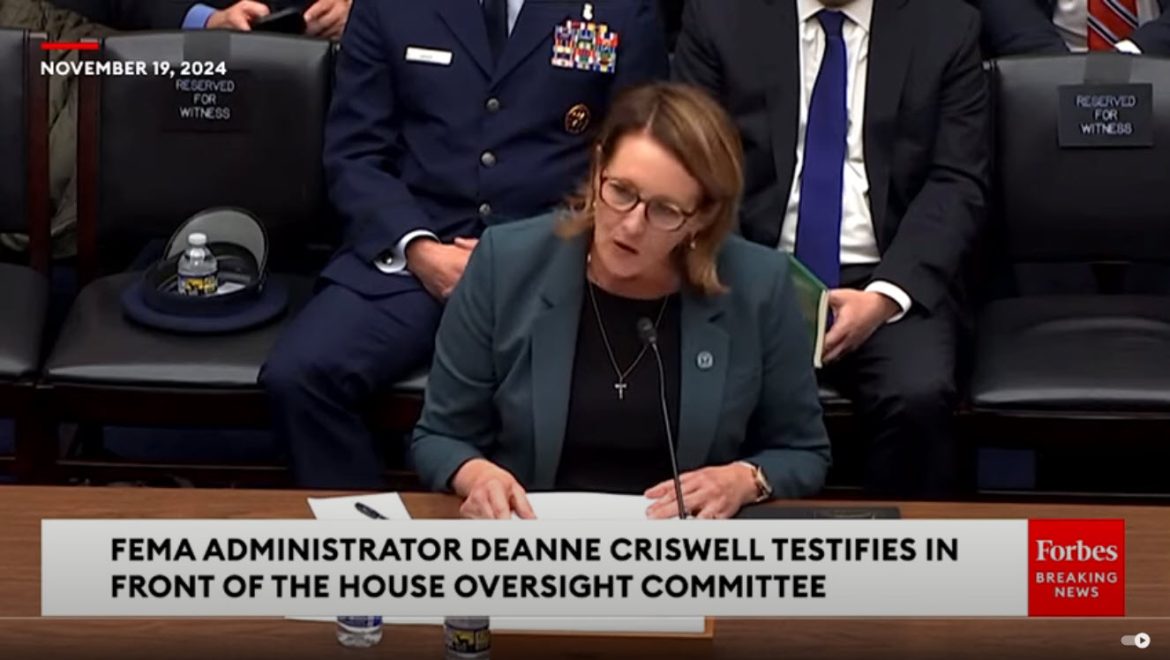Federal Emergency Management Agency (FEMA) Administrator Deanne Criswell faces heated questioning from lawmakers in a high-stakes House Oversight Committee hearing today, as allegations of politically motivated disaster relief distribution during recent hurricane seasons take center stage.
The controversy erupted after former FEMA employee Marn’i Washington alleged that relief workers in Florida were directed to avoid providing aid to homes displaying signs supporting former President Donald Trump. Washington, who has since been terminated, claims she was unfairly scapegoated and insists she was following orders.
During her testimony, Criswell strongly denies the accusations, labeling them as “baseless and politically charged.” She asserts that FEMA’s disaster response protocols are apolitical, stating, “Our mission is to save lives and provide relief to all Americans in need, regardless of political affiliation.”
Allegations of Political Bias
The allegations stem from Hurricane Milton and Hurricane Helene relief efforts, where Washington claims explicit instructions were given to bypass homes with Trump campaign signs. Washington, in interviews with outlets like NewsNation, denies acting independently, saying, “I was simply following orders.” She also denies any personal political bias, emphasizing, “I didn’t vote for Kamala Harris, and this isn’t about politics for me.”
Florida’s Republican Attorney General filed a lawsuit last week, accusing FEMA leadership, including Criswell, of agreeing to deny Trump supporters aid during the storms. The lawsuit adds fuel to an already politically charged debate over the federal agency’s impartiality.
Bipartisan Scrutiny
During the hearing, lawmakers from both parties demand answers. Republicans accuse FEMA of partisan discrimination, with Rep. James Comer (R-KY) stating, “Every American deserves equal treatment after a disaster. If these allegations are true, they represent a betrayal of public trust.”
Democrats defend Criswell, framing the allegations as politically motivated attacks. Rep. Jamie Raskin (D-MD) argues, “This is yet another attempt to undermine a federal agency doing critical work in disaster relief.”
Criswell defends FEMA’s track record, highlighting its extensive efforts to aid Florida communities impacted by hurricanes. “Our agency provided billions in relief and deployed thousands of personnel to support recovery efforts,” she testifies.
Washington’s Defense
In a written statement submitted to the committee, Washington reiterates her claim of being framed. She alleges that her termination was a move to shift blame away from senior FEMA officials. “I was following protocols provided to me. I did not deviate from the instructions given by my supervisors,” her statement reads.
She also raises concerns about a “toxic culture of blame-shifting” within FEMA, urging Congress to investigate the chain of command during the hurricane relief efforts.
Fallout and Implications
The allegations of politicization have broader implications for FEMA and other federal agencies. Public trust in disaster relief programs is at stake, with some lawmakers calling for a full-scale audit of FEMA’s operations during recent hurricane seasons.
As the hearing continues, both Criswell and Washington’s testimonies are likely to fuel further political divisions. FEMA’s internal review of the matter remains ongoing, and the agency has yet to release its findings.
The House Oversight Committee plans to call additional witnesses, including field workers and regional FEMA coordinators, in the coming weeks to gather a fuller picture of the events.



